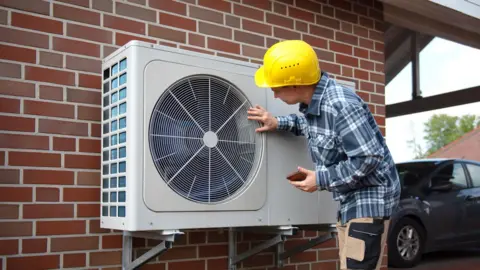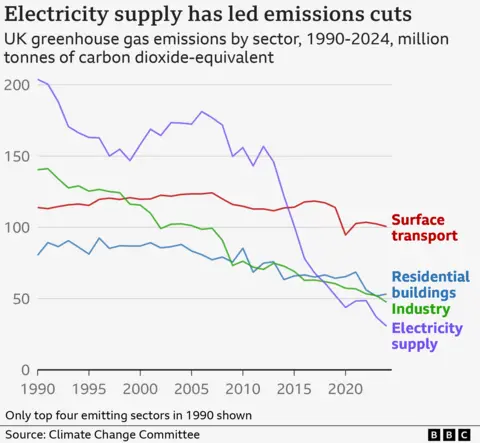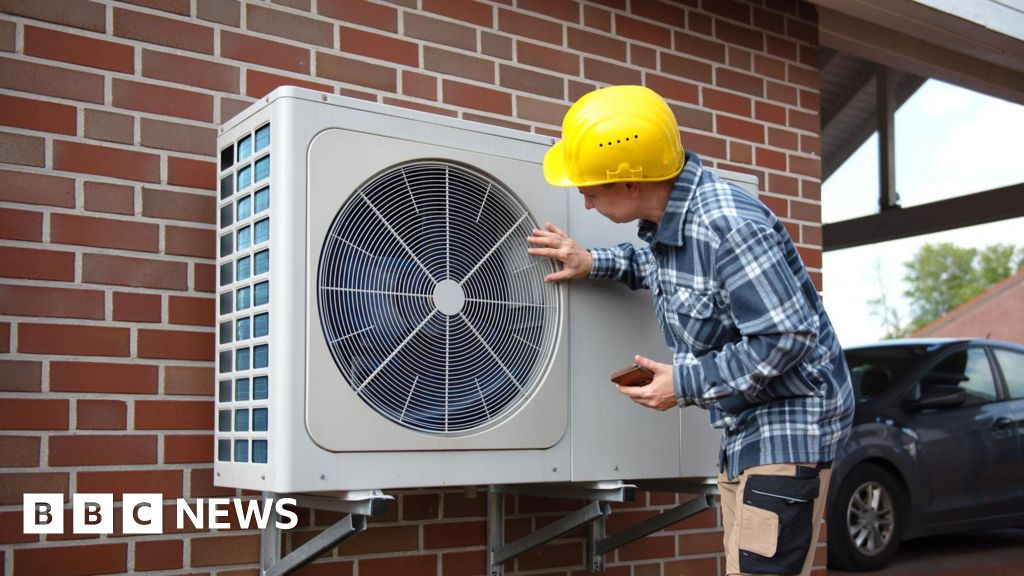Climate reporter, BBC News
 Getty Images
Getty ImagesMore people are buying electric cars and installing heat pumps than ever before, but those numbers need to increase even further, according to the government’s climate advisers.
The independent Climate Change Committee said that the government needed to make sure that households benefit from the switch to cleaner technologies through lower bills.
“The government has made progress on a number of fronts, including on clean power, [but] they need to do more on making electricity cheap,” Emma Pinchbeck, chief executive of the CCC, told BBC News.
In response Energy Secretary Ed Miliband thanked the committee for its advice and said it was committed to bringing down bills.
By law, the UK must stop adding to the total amount of planet-warming greenhouse gases in the atmosphere by 2050. This is known as “net zero”.
Reaching net zero carbon dioxide emissions globally is widely seen as essential to limit further warming.
Previous political consensus around the UK’s target has broken down, however, with Conservative leader Kemi Badenoch branding it “impossible” and Reform using the phrase “net stupid zero”.
But the committee argues it is achievable and could lead to long-term economic benefits.
“[The UK] can absolutely meet net zero by 2050,” said Ms Pinchbeck.
Greenhouse gas emissions within the UK’s borders have already fallen by more than half since 1990.
But that’s mostly because polluting fossil fuels – particularly coal – have been increasingly replaced with renewable energy like wind and solar for electricity generation.

The UK’s biggest emitters last year were transport and buildings, which will also need to get cleaner to help reach net zero.
The CCC sees signs of progress, including a near doubling of the number of electric cars on UK roads in the past two years. Nearly one-in-five new cars sold in 2024 was electric.
This has helped to reduce emissions from transport – not counting planes and ships – for the second year in a row, even though traffic levels rose last year.
While new electric cars remain more expensive to buy than their petrol equivalents, the CCC expects them to cost the same in a couple of years.
Many second-hand models are already as cheap, and electric cars can be more economical to run too.
“We see these transitions happen surprisingly fast once they get going, usually starting slowly and accelerating rapidly, where falling prices and rising demand reinforce each other,” said Dr Emily Nurse, the CCC’s head of net zero.
“When that’s combined with effective policy, it really can lead to this rapid change.”
Heat pump progress but a long way to go
Sales of electric heat pumps are growing quickly too, up by more than half last year, thanks partly to grants introduced under the Conservatives, the CCC said. But they still remain well below target.
The committee also praised the new government’s relaxation of planning rules, which it says should encourage more people to install heat pumps.
But even after grants, they can be expensive to install and while they are much more efficient than a gas boiler, they are not necessarily cheaper to run.
That’s because the cost of electricity is so high, something the CCC has repeatedly said needs tackling.
Make electricity cheaper
The single largest reason for the rise in household electricity prices in recent years is the increase in wholesale costs, driven by international gas prices, the CCC says.
“The only way to get bills down for good is by becoming a clean energy superpower and we continue to work tirelessly to deliver clean power for families and businesses,” argued Energy Secretary Ed Miliband.
But the committee adds that electricity bills are artificially high because charges are added to them to support largely older renewable energy projects – which were more expensive – as well as energy efficiency upgrades.
On Monday the government announced plans to remove these costs for some businesses.
Removing them from household electricity bills too would be a quick fix to the UK’s high prices, making it much cheaper to run an electric car or heat pump, the committee says.
But these costs would have to go somewhere, potentially onto general taxation.
It would take “about £200 off the average [household] bill but at a cost of about £6bn per year to the Exchequer,” said Adam Bell, director of policy at Stonehaven Consultancy and former head of energy strategy at the Department of Business, Energy and Industrial Strategy.
Additional reporting by Jonah Fisher and Miho Tanaka









